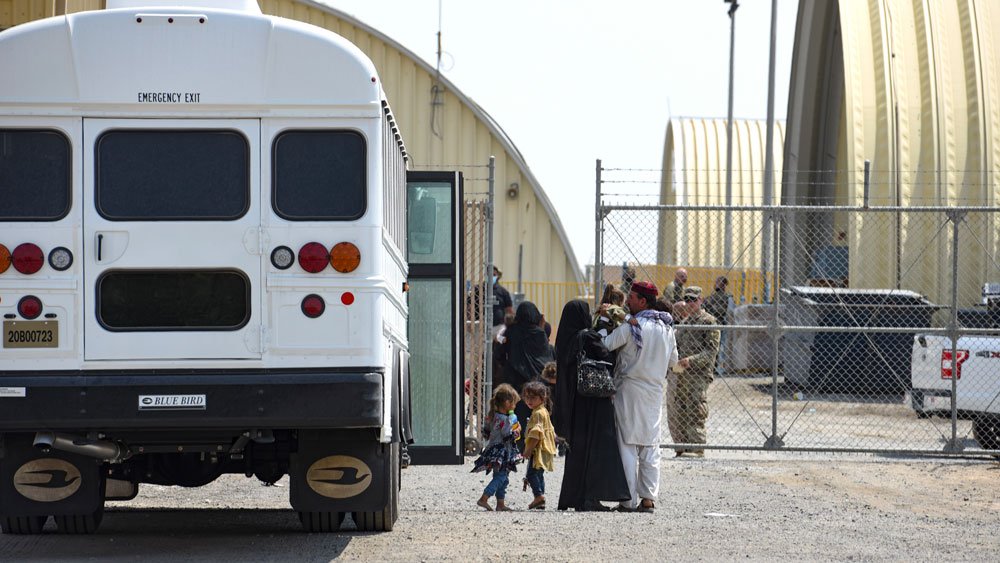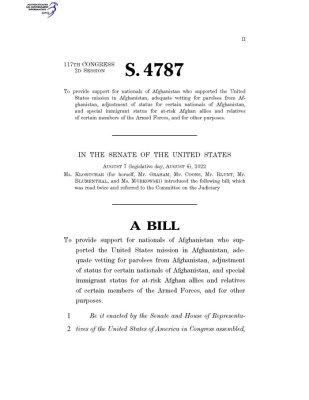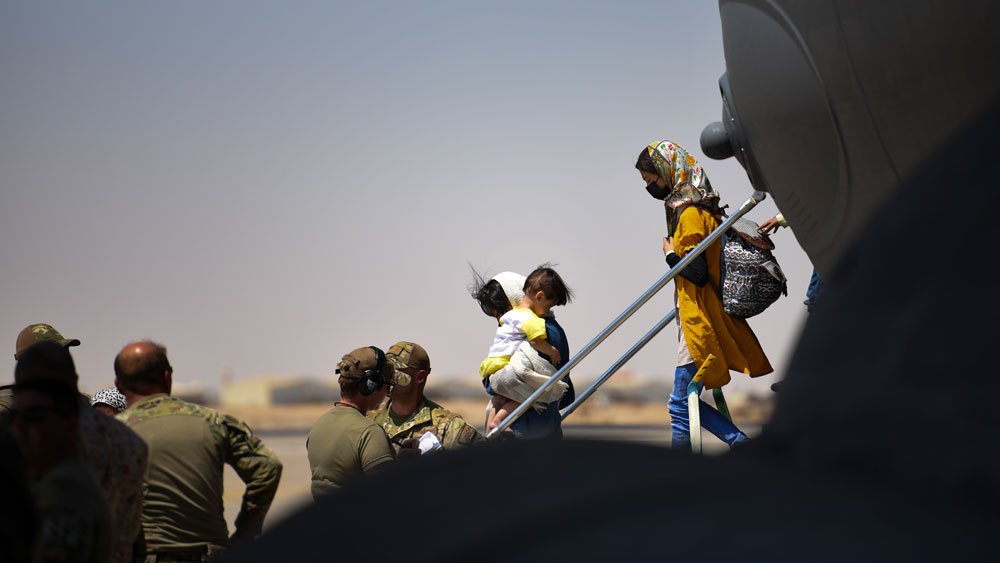Thousands of Afghan Allies Who Fled After US Withdrawal Trapped in Immigration Limbo Retired military brass slam Republican lawmaker proposal as distraction
Three years have passed since President Joe Biden announced that the United States would pull all of its 2,500 troops out of Afghanistan, starting a chain reaction that ended in thousands of Afghans flooding Hamid Karzai International Airport, hoping to escape the resurging violent theocracy of Taliban rule.
Tens of thousands of those Afghans had worked with the U.S. government as interpreters, fixers, drivers, and more during the previous 20 years, earning them the opportunity to secure a special immigrant visa (SIV) and bring their families to the United States.
Their work also put a target on their backs, with the Taliban hunting down anyone who helped Americans in the wake of their takeover of the Afghan government.
But the SIV program, which only granted several thousand visas a year in the years leading up to the U.S. withdrawal from Afghanistan, is severely backlogged, and it requires recipients to provide detailed information about their past employment by the U.S. government and then have it verified by the State Department.
So in the rush to evacuate more than 120,000 people from Afghanistan in the last six weeks of the U.S. campaign there, tens of thousands were admitted to the U.S. instead under special humanitarian parole, a status that allows them to live and work in the United States but that needs to be renewed.
Many of them are now stuck in an immigration limbo, with no straightforward path to legal permanent residency or citizenship in their new home.

Afghan evacuees arrive to passenger terminal where they receive food, water, and other essentials at Ali Al Salem Air Base, Kuwait, August 25, 2021. (U.S. Air Force photo by Staff Sgt. Ryan Brooks)
About 30% of more than 50,000 applications for humanitarian parole by Afghans living outside the U.S. have been approved or denied, according to a letter Sen. Ed Markey, D-Mass., sent to U.S. Citizenship and Immigration Services earlier this year.
USCIS did not respond to a request from The War Horse for the current number of Afghans already in the United States on humanitarian parole. The State Department has issued roughly 117,000 Afghan SIVs since the program began in 2009, according to data provided to The War Horse. One third of those have been granted since the U.S. withdrawal in 2021.
Refugees who receive humanitarian parole as part of Operation Allies Welcome aren’t in the established asylum system, because they would have had to apply for that outside of the United States before their evacuation from Afghanistan. Special visa holders, on the other hand, are able to apply for green cards once they’ve established residency in the U.S.
The Afghan Adjustment Act, first introduced in the Senate in August 2022, would clear the path to legal permanent residency and eventually citizenship in two ways: first, by expanding eligibility criteria for SIVs, so that fewer Afghans still trying to escape Afghanistan have to apply for humanitarian parole; and second, by allowing those Afghans to apply for legal permanent residency within two years of arrival in the United States.

Introduced in August 2022, the Afghan Adjustment Act would clear the path to legal and permanent residency for qualifying Afghans. (Document courtesy of the 117th Congress)
The legislation has been inserted into multiple spending bills since Sen. Amy Klobuchar, D-Minn., first introduced it, but because of Republican opposition, it has ended up being removed.
“This bill never had any paid lobbying support behind it, any real lobbying effort” or advertising campaigns, Shawn VanDiver, president of #AfghanEvac and a former enlisted sailor, told The War Horse in March. “There were no big lobbying days en masse on the hill.”
Grassroots efforts by veterans and frontline civilians, he said, not only kept the bill alive but helped expand support across the partisan aisle.
Klobuchar reintroduced the proposed legislation in February as an amendment to a national security supplemental with funding for Ukraine, with Sen. Jerry Moran, R-Kan., as a co-sponsor and the backing of a bipartisan group of 13 of their colleagues.
“Unfortunately, many of our Afghan partners are still overseas, and those who made it to the U.S. face uncertainty as to whether they will be granted permanent residency,” Moran said in a statement at the time. “I urge my colleagues to support the inclusion of the Afghan Adjustment Act in the National Security supplemental to grant Afghan refugees stability, bolster our national security and send a message to U.S. partners and allies that we will honor our word.”
But the bill, and the national security supplemental, continue to be held up by Republican lawmakers.
A Problematic Alternative
Sen. Tom Cotton, R-Arkansas, a former Army officer and Afghanistan war veteran, last summer introduced a competing bill that in theory would address the issue of Afghans both in the United States and those still hoping to come here.
The Ensuring American Security and Protecting Afghan Allies Act would require evacuees to submit to the standards required to grant refugee status, a bar that may not be reachable for Afghans who have already been in the United States for multiple years. Those standards include providing evidence that they would face targeted persecution in Afghanistan.
Cotton was one of the loudest voices in the waning days of the war, demanding answers from the Biden administration about allies left behind in Afghanistan.
Award-Winning Journalism in Your Inbox
“And unfortunately … he’s been trying to use their plight to mess with the parole authority that the president has, because he doesn’t like it,” VanDiver said, meaning the president’s discretionary power to grant legal immigration status.
Cotton’s bill would not meaningfully increase the number of Afghans who can come to the United States or receive legal permanent residency, according to a letter signed by dozens of retired generals and flag officers and sent to congressional leaders last year.
It also includes language on parole reform, which would not only hamper the president’s existing ability to grant temporary humanitarian parole for Afghans but would make the temporary parole harder to extend to any immigrants.

Afghan evacuees leave a U.S. C-17 Globemaster after arriving to Ali Al Salem Air Base, Kuwait, August 26, 2021.(U.S. Air Force photo by Staff Sgt. Ryan Brooks)
“This is not the proper venue for large-scale immigration reform—our focus must now be on protecting our Afghan allies,” the letter reads. “These allies have been waiting years for Congress to do its duty and honor America’s promise to Afghanistan; they should not be used as pawns in a political debate on immigration.”
Cotton’s office did not respond to multiple requests for comment on his opposition to the Afghan Adjustment Act.
Now, well into an election year, advocates aren’t confident that any legislation will make it to a vote.
“Who knows what happens?” VanDiver said. “If the Trump administration’s in, they’re going to break this again,” referring to Trump administration moves that slowed processing of Afghan SIVs.
Our Journalism Depends on Your Support
While USCIS has been renewing humanitarian parole in the meantime, there are other provisions of the Afghan Adjustment Act that would secure the future for the thousands of other Afghans who are still coming to the United States monthly, VanDiver added.
Those include an interagency task force to create a long-term plan for Afghan evacuation and resettlement, with regular reports due to Congress on the number of evacuees in the United States, a government office in Afghanistan to process SIVs, and a waiving of fees for the immigration process.
“We’re making sure that we’re taking care of them,” VanDiver said. “This would just make it a lot easier. And they deserve to have their lives be easier.”
This War Horse feature was reported by Meghann Myers, edited by Erica Goode, fact-checked by Jess Rohan, and copy-edited by Mitchell Hansen-Dewar. Abbie Bennett wrote the headlines.





Comments are closed.